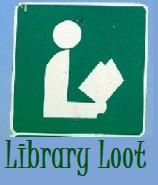
Here's what I got this week:
Things I've Been Silent About by Azar Nafisi
Azar Nafisi, author of the beloved international bestseller Reading Lolita in Tehran, now gives us a stunning personal story of growing up in a family in Iran, moving memories of her life lived in thrall to a powerful and difficult mother, against the background of Iran during a time of revolution and change. A young girl's pain over family secrets and a mother's lost life, a young woman's discovery of the power of sensuality in literature, the price a family pays for freedom in a country beset by political upheaval — these and other threads are woven together in this beautiful memoir, as a gifted storyteller once again uses her own life to transform the way we see the world and "reminds us of why we read in the first place"Half of a Yellow Sun by Chimamanda Ngozi Adichie
I read Purple Hibiscus and quite enjoyed it, so I'm looking forward to this one.
With her award-winning debut novel, Purple Hibiscus, Chimamanda Ngozi Adichie was heralded by the Washington Post Book World as the “21st century daughter” of Chinua Achebe. Now, in her masterly, haunting new novel, she recreates a seminal moment in modern African history: Biafra’s impassioned struggle to establish an independent republic in Nigeria during the 1960s.An Episode in the Life of a Landscape Painter by Cesar Aira
I've yet to read anything by Cesar Aira, this was the only work of his available on the library shelves though.
An astounding novel from Argentina that is a meditation on the beautiful and the grotesque in nature, the art of landscape painting, and one experience in a man's life that became a lightning rod for inspiration. "An Episode in the Life of a Landscape Painter" is the story of a moment in the life of the German artist Johan Moritz Rugendas (1802-1858). Greatly admired as a master landscape painter, he was advised by Alexander von Humboldt to travel West from Europe to record the spectacular landscapes of Chile, Argentina, and Mexico. Rugendas did in fact become one of the best of the nineteenth-century European painters to venture into Latin America. However this is not a biography of Rugendas. This work of fiction weaves an almost surreal history around the secret objective behind Rugendas' trips to America: to visit Argentina in order to achieve in art the "physiognomic totality" of von Humboldt's scientific vision of the whole. Rugendas is convinced that only in the mysterious vastness of the immense plains will he find true inspiration. A brief and dramatic visit to Mendosa gives him the chance to fulfill his dream. From there he travels straight out onto the pampas, praying for that impossible moment, which would come only at an immense price--an almost monstrously exorbitant price--that would ultimately challenge his drawing and force him to create a new way of making art. A strange episode that he could not avoid absorbing savagely into his own body interrupts the trip and irreversibly and explosively marks him for life.Once upon a Quinceanera by Julia Alvarez
This has been on my TBR list for a while, although I can't remember where I heard about it.
The bestselling author of How the García Girls Lost Their Accents explores the phenomenon of the Latina "sweet fifteen" celebrationThe Razor's Edge by Somerset MaughamThe quinceañera, the fifteenth birthday celebration for a Latina girl, is quickly becoming an American event. This legendary party is a sight to behold: lavish ball gowns, extravagant catered meals, DJs, limousines, and multi-tiered cakes. The must haves for a "quince" are becoming as numerous and costly as a prom or wedding. And yet, this elaborate ritual also hearkens back to traditions from native countries and communities, offering young Latinas a chance to connect with their heritage.
In Once Upon a Quinceañera, Julia Alvarez explores this celebration that brings a Latina girl into womanhood. She attends the quince of a young woman named "Monica" who lives in Queens, and witnesses the commotion, confusion, and potential for disaster that comes with planning this important event. Alvarez also weaves in interviews with other quince girls, her own memories of coming of age as an immigrant, and the history of the custom itself — how it originated and what has changed as Latinas become accustomed to a supersize American culture. Once Upon a Quinceañera is an enlightening, accessible, and entertaining portrait of contemporary Latino culture as well as a critical look at the rituals of coming of age and the economic and social consequences of the quince parties. Julia Alvarez's dedicated fans will be eager to hear her thoughts on this topic. It is a great book for anyone interested in American youth today — parents, teachers, and teenagers themselves.
Larry Darrell is a young American in search of the absolute. The progress of his spiritual odyssey involves him with some of Maugham's most brilliant characters — his fiancée Isabel whose choice between love and wealth have lifelong repercussions, and Elliott Templeton, her uncle, a classic expatriate American snob. Maugham himself wanders in and out of the story, to observe his characters struggling with their fates.The Boat by Nam Le
I've been waiting to get my hands on this for a while, especially after Mel went to his reading in Iowa.
A stunningly inventive, deeply moving fiction debut: stories that take us from the slums of Colombia to the streets of Tehran; from New York City to Iowa City; from a tiny fishing village in Australia to a foundering vessel in the South China Sea, in a masterly display of literary virtuosity and feeling.De Niro's Game by Rawi HageIn the magnificent opening story, "Love and Honor and Pity and Pride and Compassion and Sacrifice," a young writer is urged by his friends to mine his father's experiences in Vietnam — and what seems at first a satire of turning one's life into literary commerce becomes a transcendent exploration of homeland, and the ties between father and son. "Cartagena" provides a visceral glimpse of life in Colombia as it enters the mind of a fourteen-year-old hit man facing the ultimate test. In "Meeting Elise," an aging New York painter mourns his body's decline as he prepares to meet his daughter on the eve of her Carnegie Hall debut. And with graceful symmetry, the final, title story returns to Vietnam, to a fishing trawler crowded with refugees, where a young woman's bond with a mother and her small son forces both women to a shattering decision.
Brilliant, daring, and demonstrating a jaw-dropping versatility of voice and point of view, The Boat is an extraordinary work of fiction that takes us to the heart of what it means to be human, and announces a writer of astonishing gifts.
I think of all the literary prizes out there, the one I'm always the most interested in is the shortlist from the International IMPAC Dublin Literary Award, which this book won last year. I like how the longlist is chosen by libraries around the world, and the longlist is always such fun to browse through for reading ideas.
Childhood best friends Bassam and George have grown to be men in war-ravaged Beirut. Now they must choose between the only two futures available to them: to stay in the devastated city and consolidate power through crime or to go into exile abroad, alienated from the only existence they have ever known.The Astonishing Life of Octavian Nothing Volume I: The Pox Party by M.T. AndersonTold in a distinctive, captivating voice that fuses vivid cinematic imagery, a page-turning plot, and exquisite, dark poetry, De Niro's Game is an explosive portrait of life in a war zone and a powerful meditation on what comes after. It won the prestigious International IMPAC Dublin Literary Award in 2008.
The weird thing is that the library filed volume one in the adult section, but volume two is located under young adult fiction.
A gothic tale becomes all too shockingly real in this mesmerizing magnum opus by the acclaimed author of Feed.Intuition by Allegra GoodmanIt sounds like a fairy tale. He is a boy dressed in silks and white wigs and given the finest of classical educations. Raised by a group of rational philosophers known only by numbers, the boy and his mother — a princess in exile from a faraway land — are the only persons in their household assigned names. As the boy's regal mother, Cassiopeia, entertains the house scholars with her beauty and wit, young Octavian begins to question the purpose behind his guardians' fanatical studies. Only after he dares to open a forbidden door does he learn the hideous nature of their experiments — and his own chilling role in them.
Set against the disquiet of Revolutionary Boston, M. T. Anderson's extraordinary novel takes place at a time when American Patriots rioted and battled to win liberty while African slaves were entreated to risk their lives for a freedom they would never claim. The first of two parts, this deeply provocative novel reimagines the past as an eerie place that has startling resonance for readers today.
Nominated for this year's Orange Prize. I remember reading about it on the various book blogs, as well as in this piece from The Guardian.
Hailed as “a writer of uncommon clarity” by the New Yorker, National Book Award finalist Allegra Goodman has dazzled readers with her acclaimed works of fiction, including such beloved bestsellers as The Family Markowitz and Kaaterskill Falls. Now she returns with a bracing new novel, at once an intricate mystery and a rich human drama set in the high-stakes atmosphere of a prestigious research institute in Cambridge, Massachusetts.Have you read any of these books? Let me know what you thought of them.Sandy Glass, a charismatic publicity-seeking oncologist, and Marion Mendelssohn, a pure, exacting scientist, are codirectors of a lab at the Philpott Institute dedicated to cancer research and desperately in need of a grant. Both mentors and supervisors of their young postdoctoral protégés, Glass and Mendelssohn demand dedication and obedience in a competitive environment where funding is scarce and results elusive. So when the experiments of Cliff Bannaker, a young postdoc in a rut, begin to work, the entire lab becomes giddy with newfound expectations. But Cliff’s rigorous colleague–and girlfriend–Robin Decker suspects the unthinkable: that his findings are fraudulent. As Robin makes her private doubts public and Cliff maintains his innocence, a life-changing controversy engulfs the lab and everyone in it.
With extraordinary insight, Allegra Goodman brilliantly explores the intricate mixture of workplace intrigue, scientific ardor, and the moral consequences of a rush to judgment. She has written an unforgettable novel.



5 comments:
I'm jealous of pretty much your entire stack of library loot! The Boat really jumped out at me, but so many sound great. :D
I loved Half of A Yellow Sun - I don't know many people who have read it, I hope you enjoy it. The Pox Party is next on my list of teen books to read. I've heard lots of good things!
You've got a great stack of books!
Half a Yellow Sun is on my tbr list and I've been curious about Nafisi's new book, too.
Half of a yellow sun is a very accomplished and affecting novel, if you enjoyed Purple Hibiscus you'll probably enjoy it.
I loved Reading Lolita in Tehran and have been coveting Azar Nafisi's new book. I'll be interested to hear about it.
I've heard very good things about De Niro's Game, The Boat and The Astonishing Life of Octavian Nothing, I must read all of them someday.
Enjoy The Boat :)
Post a Comment